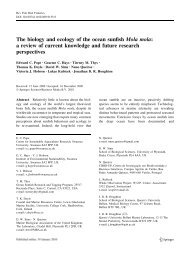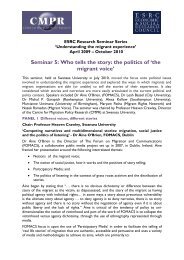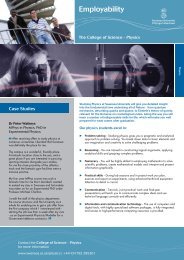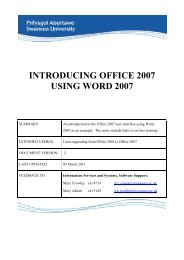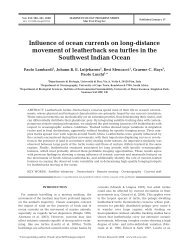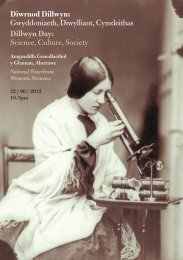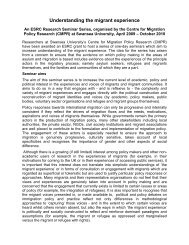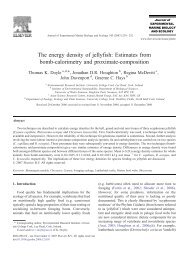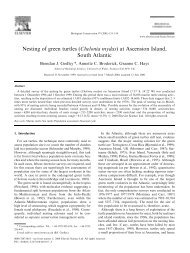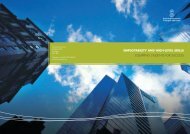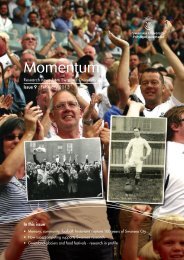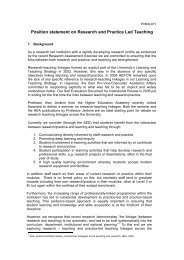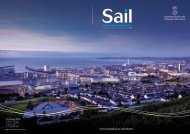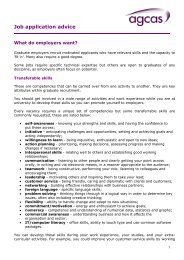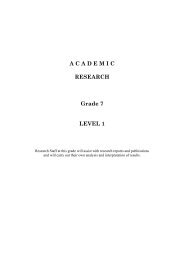Postgraduate Prospectus 2013 - Swansea University
Postgraduate Prospectus 2013 - Swansea University
Postgraduate Prospectus 2013 - Swansea University
Create successful ePaper yourself
Turn your PDF publications into a flip-book with our unique Google optimized e-Paper software.
English<br />
Research opportunities<br />
MA by Research/MPhil/PhD<br />
RAE2008 60% of research rated<br />
world-leading (4*) or internationally<br />
excellent (3*)<br />
Professors<br />
C Belsey<br />
S Davies<br />
C Franklin<br />
Nuria Lorenzo-Dus<br />
Jim Milton<br />
N Reeve<br />
D Smith<br />
M W Thomas<br />
Academic and research staff 30<br />
<strong>Postgraduate</strong>s 190<br />
Entry requirements:<br />
Normally a good Honours degree<br />
(first-class or 2.1) in English. For PhD<br />
programmes in Linguistics, an MA in<br />
Linguistics or a related discipline, and<br />
experience of empirical research, is<br />
normally required.<br />
English Language requirement:<br />
IELTS 6.5 (with a minimum of 5.5 in each<br />
component) or <strong>Swansea</strong> <strong>University</strong><br />
recognised equivalent.<br />
Scholarships and Bursaries<br />
A range of postgraduate scholarships<br />
and bursaries is available.<br />
For details, please visit: www.swansea.<br />
ac.uk/scholarships/<strong>Postgraduate</strong><br />
Funding may also be available from the<br />
Arts and Humanities Research Council.<br />
How can I find out more?<br />
Visit our website:<br />
www.swansea.ac.uk/artsandhumanities/<br />
AboutUs/EnglishLanguageandLiterature/<br />
Contact the Admissions Tutor:<br />
Email:<br />
COAHGradCentrePGRAdmissions@<br />
swansea.ac.uk<br />
Tel: +44 (0)1792 295926<br />
Visit the <strong>University</strong>:<br />
see page 174 for details<br />
Applications can be made online at:<br />
www.swansea.ac.uk/applyonline<br />
– see pages 176 – 177 for further<br />
information<br />
For details of the Master’s courses<br />
available in English, please see page 54.<br />
Research Degrees – English<br />
English at <strong>Swansea</strong> <strong>University</strong> has been<br />
a respected centre for research into<br />
medieval, renaissance and eighteenthcentury<br />
language and literature for over<br />
90 years.<br />
Today it is equally renowned for expertise<br />
in Linguistics, Gender Studies, Welsh<br />
Writing in English, twentieth and<br />
twenty-first century literature and Creative<br />
Writing. Many of the staff are sought as<br />
experts appearing on radio and TV, and<br />
write regularly for broadsheet newspapers<br />
and major reviews.<br />
Research degrees in English will:<br />
• equip you with skills relevant for a<br />
rewarding career in a range of diverse<br />
fields, including academia, teaching,<br />
Civil Service, journalism, speech<br />
therapy, publishing, arts management<br />
and communications, writing as well<br />
as becoming published authors<br />
• provide you with new and<br />
specialised research skills<br />
• prepare you for a career in academic<br />
research and teaching<br />
Research Strengths<br />
Particular research interests include:<br />
• Medieval literature, especially<br />
anchoritism, Arthurian narratives<br />
and the medieval town<br />
• Poetry and drama of the sixteenth<br />
and seventeenth centuries<br />
• Women’s writing and culture<br />
1750-1870<br />
• Romantic and Gothic literature;<br />
Mary Wollstonecraft, Lord Byron,<br />
William Blake, Mary Shelley.<br />
• Romantic Orientalism;<br />
Sir William Jones, British India<br />
• Twentieth-century fiction, especially<br />
D H Lawrence, Border writing and<br />
the literature of the Cold War,<br />
Angela Carter<br />
• Welsh Writing in English, including<br />
Dylan Thomas, Raymond Williams<br />
and Welsh women’s writing<br />
• Irish writing, including Yeats, Joyce<br />
and Irish poetry since 1900<br />
• Modern and contemporary poetry,<br />
including J H Prynne<br />
• Critical theory, especially cultural,<br />
feminist, psychoanalytic and<br />
canon theory<br />
• American literature, including<br />
the Harlem Renaissance and Whitman<br />
• Film and visual narrative<br />
• Gender in literature, critical theory<br />
and culture from the medieval period<br />
to the twenty-first century<br />
• Creative writing, especially Fiction<br />
and Poetry<br />
• Linguistics and sociolinguistics<br />
• Second Language Acquisition<br />
processes, particularly Vocabulary<br />
Acquisition<br />
• Language testing<br />
• Language in education, particularly<br />
with respect to English Language<br />
Teaching<br />
• TEFL<br />
• Translation<br />
• Stylistics<br />
• Discourse Analysis<br />
Part-time distance PhD Applied Linguistics<br />
In addition to the full-time PhD programme<br />
in Linguistics, the Department offers a<br />
part-time, distance-learning PhD in Applied<br />
Linguistics. This scheme is centred on the<br />
Vocabulary Acquisition Research Group<br />
and is aimed at English language teachers<br />
working abroad who want to maintain an<br />
academic base in the UK. The programme<br />
is highly structured, the work for each year<br />
being tightly organised round a series of<br />
training tasks and experimental projects,<br />
and usually takes six years to complete.<br />
Research Institute for Arts and Humanities<br />
The Research Institute for Arts and<br />
Humanities (RIAH) supports the Richard<br />
Burton Centre for the Study of Wales, an<br />
interdisciplinary forum that focuses on the<br />
cultural and historical traditions in the<br />
Welsh and English languages. It also runs<br />
an annual postgraduate conference,<br />
postgraduate workshops and provides<br />
support for postgraduate research<br />
expenses and practical help with grant<br />
applications.<br />
All research students in English belong to<br />
the Graduate Centre in the College of<br />
Arts and Humanities which provides<br />
pastoral guidance as well as<br />
administrative and academic facilities<br />
Graduate students are provided with<br />
fully-equipped workstations and a<br />
common room, regular research training<br />
and the opportunity of teaching<br />
experience. Many are attached to<br />
interdisciplinary research centres, based<br />
in the Department, which run conferences<br />
and a regular seminar programme<br />
throughout the year, such as:<br />
• CREW, the Centre for Research into the<br />
English Language and Literature of<br />
Wales<br />
• GENCAS, the Centre for Research into<br />
Gender in Culture and Society<br />
• MEMO, the Centre for Medieval and<br />
Early Modern Research<br />
• WAWR, the Wales and the West<br />
Romanticism Seminar<br />
• VARG, the Vocabulary Acquisition<br />
Research Group<br />
For further information about RIAH,<br />
visit: www.swansea.ac.uk/<br />
artsandhumanities/riah<br />
The Department also holds the Archive of<br />
Welsh English (based on the Survey of<br />
Anglo-Welsh Dialects). The extensive<br />
Anglo-Welsh material is supplemented by<br />
three other important local collections: the<br />
Gwyn Thomas and the John Ormond<br />
collections at the Miners’ Library and the<br />
Dylan Thomas collection in the City and<br />
Council of <strong>Swansea</strong>’s Central Library.<br />
The Richard Burton Archives hold the<br />
archives of Raymond Williams,<br />
Ron Berry and Alun Richards.<br />
114<br />
115



